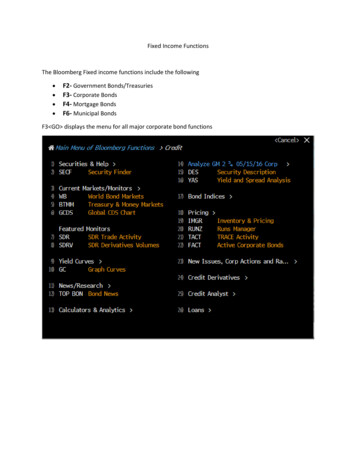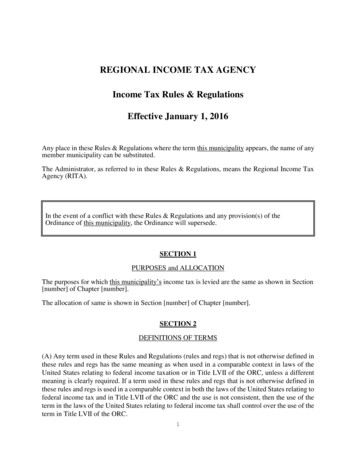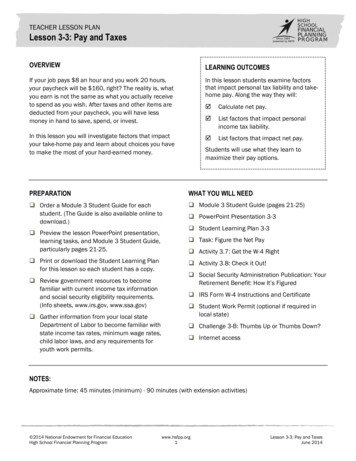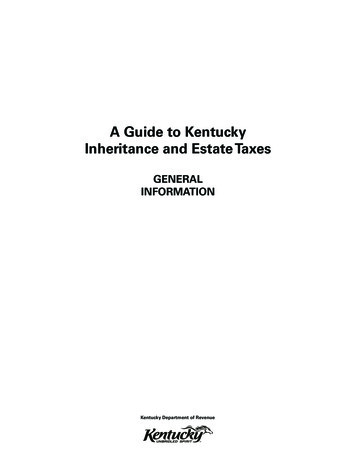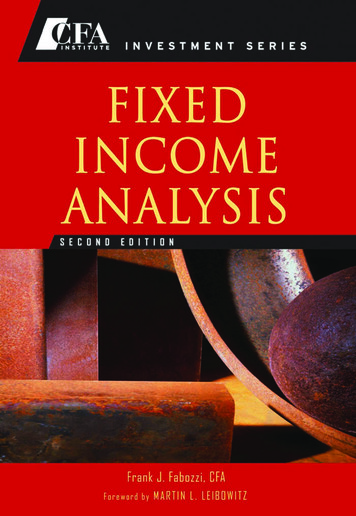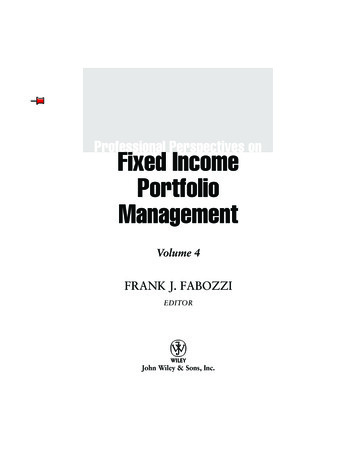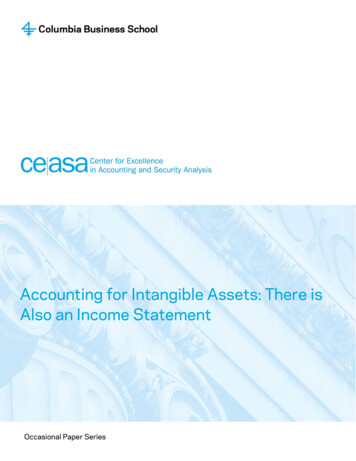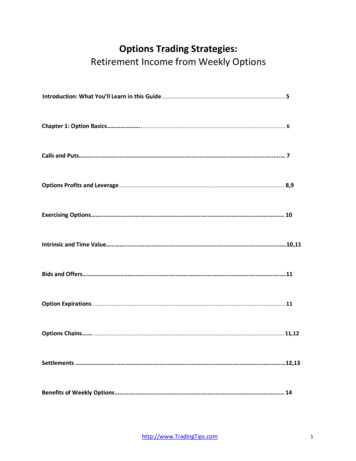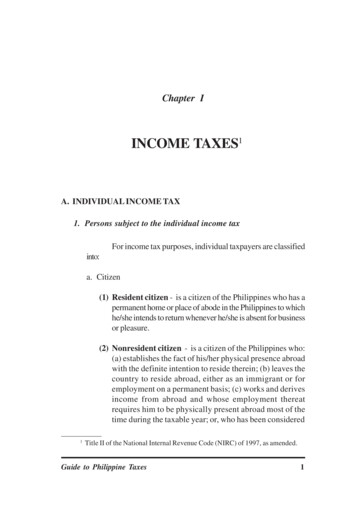
Transcription
Chapter IINCOME TAXES1A. INDIVIDUAL INCOME TAX1. Persons subject to the individual income taxFor income tax purposes, individual taxpayers are classifiedinto:a. Citizen(1) Resident citizen - is a citizen of the Philippines who has apermanent home or place of abode in the Philippines to whichhe/she intends to return whenever he/she is absent for businessor pleasure.(2) Nonresident citizen - is a citizen of the Philippines who:(a) establishes the fact of his/her physical presence abroadEO 22 with the definite intention to reside therein; (b) leaves thecountry to reside abroad, either as an immigrant or foremployment on a permanent basis; (c) works and derivesincome from abroad and whose employment thereatrequires him to be physically present abroad most of thetime during the taxable year; or, who has been considered1Title II of the National Internal Revenue Code (NIRC) of 1997, as amended.Guide to Philippine Taxes1
Chapter IIncome Taxesnonresident citizen previously and who arrives in thePhilippines at anytime during the taxable year to residepermanently in the Philippines shall be treated as nonresidentcitizen for the taxable year in which he arrives in the Philippineswith respect to his income abroad until the date of his arrivalin the Philippines.2b. Alien(1) Resident alien - is an individual who is not a citizen of thePhilippines but whose residence is within the Philippines.3(2) Nonresident alien - is an individual who is not a citizen ofthe Philippines and whose residence is not within thePhilippines.4A nonresident alien is deemed engaged in trade orbusiness in the Philippines if he/she has stayed in thePhilippines for an aggregate period of more than 180 daysduring any calendar year.52. Income subject to taxThe incomes of individuals are grouped into differentcategories, to wit:a. Compensation income, consists of income arising fromemployer-employee relationship such as salaries, wages,emoluments and honoraria, commissions, taxable bonuses and22Sec. 22(E), supra.3Sec. 22(F), supra.4Sec. 22(G), supra.5Sec. 25(A)(1), supra.Guide to Philippine Taxes
Chapter IIncome Taxesfringe benefits, taxable allowances (such as transportation,representation, entertainment, and the like)6, non-monetarycompensation, director’s fees and the like, taxable pensions andretirement pay, amounts drawn as salaries by partners of apartnership and other incomes of a similar nature unlessspecifically exempted by the Tax Code. [refer to item A (4)]b. Business income and income from profession, consist ofbusiness and/or trade income, fees from the exercise ofprofession, gains from sale or exchange of assets, commissions,rental income, and other incomes not covered by compensationincome.c. Passive income and other sources of income7, consist of interestfrom foreign and Philippine currency bank deposits (includingyields and other monetary benefits from deposit substitutes andtrust fund and similar arrangements), royalties, prizes and otherwinnings, and dividends. The other sources of income includecapital gains from sales of shares of stock, sales of real property8,informer’s rewards, etc. 96Representation and Transportation Allowances (RATA) granted togovernment officials and employees under the General Appropriations Act are deemedas reimbursement for expenses incurred in the performance of the duties of therecipient-government officials and employees and thus are not considered as additionalcompensation taxable under the regular individual income tax and subject towithholding tax. (BIR Ruling No. 062-91).7Sec. 24(B)(1), supra.8Sec. 24(C) and (D), supra.9Revenue Regulations (RR) No. 7-2011 (issued by the BIR on June 14, 2011)provides that unutilized/excess campaign funds or campaign contributions net of anelection candidate’s campaign expenditures, shall be considered as subject to incometax, and as such, must be included in the candidate’s taxable income as stated in his/her income tax return filed for the subject taxable year.Guide to Philippine Taxes3
Chapter IIncome Taxes3. Determination of Taxable Incomea. Citizen(1) Resident citizen - on incomes derived from sources withinand without the Philippines, as follows:(a) On compensation income - on modified gross incomebasis i.e., gross compensation income less deductions and/or personal and additional exemptions;10(b) On income from profession, business and/or trade - onnet income basis i.e., gross income from profession,business and/or trade less the itemized deductions oroptional standard deduction equivalent to 40% of grosssales or gross receipts and personal and additionalexemptions; and(c) On passive income - on the gross amount thereof.(2) Nonresident citizen - taxed similarly as a resident citizenon incomes from sources within the Philippines.10Except those who are subject to 15% tax on their gross income.Section 7(A) of RR 17-2011, “Implementing the Tax Provisions of thePersonal Equity and Retirement Act (PERA) Law”, provides that a qualifiedPERA contributor is entitled to a tax credit equivalent to five percent (5%) ofthe aggregate qualified PERA contributions made in one calendar year. Eachqualified PERA contributor shall be issued a Certificate of Entitlement to5% tax credit or PERA Tax Credit Certificate, as the case may be. The entitlementto the 5% tax credit for an employee or one who is self-employed shall beallowed to be credited only against the contributor’s income tax liability;while in the case of overseas Filipinos, he/she shall be entitled to claim the5% tax credit against any national internal revenue tax liabilities (excludingthe contributor’s withholding tax liabilities as withholding agent).4Guide to Philippine Taxes
Chapter IIncome Taxesb. Alien(1) Resident alien - taxed similarly as a resident citizen onincomes received from sources within the Philippines.(2) Nonresident alien:(a) engaged in trade or business in the Philippines - taxedsimilarly as a resident citizen on incomes from sourceswithin the Philippines.(b) not engaged in trade or business in the Philippines taxed on gross income from sources within thePhilippines.(c) employed by regional or area headquarters and regionaloperating headquarters of multinational corporations,offshore banking units, or service contractors orsubcontractors engaged in petroleum operations in thePhilippines - taxed on gross income derived from suchemployment.4. Exclusions from Gross IncomeThe following are not included in the computation of the grossincome of taxpayers:11a. Proceeds of life insurance policies but not the interest paid to theheirs or beneficiaries;b. Amount received by the insured as return of premium;c. Value of property acquired by gratuitous transfer but not the incomefrom such property;11Sec. 32(B), supra.Guide to Philippine Taxes5
Chapter IIncome Taxesd. Compensation for injuries or sickness including damages received12;e. Income exempt under treaty;f. Retirement benefits, pensions, gratuities, etc. under certainconditions;g. Income derived by foreign governments, financing institutionsowned, controlled or enjoying financing from foreign governments,and international or regional financing institutions established byforeign governments, from their investments in loans, stocks, bondsor other domestic securities or from interest on their deposits inbanks in the Philippines;h. Income derived from any public utility or from the exercise of anyessential government function accruing to the Philippinegovernment or to any political subdivision;i. Prizes and awards made primarily in recognition of religious,charitable, scientific, educational, artistic, literary, or civicachievement but only if the recipient was selected without any actionon his part to enter the contest or proceeding, and is not requiredto render substantial future services as a condition to receiving theprize or award;j. Prizes and awards granted to athletes in local and internationalsports competitions and tournaments held in the Philippines orabroad and sanctioned by their respective national sportsassociations;12Republic Act (RA) No. 10368, entitled, “An Act Providing for Reparation andRecognition of Victims of Human Rights Violations During the Marcos Regime,Documentation of Said Violations, Appropriating Funds Therefor and For OtherPurposes” (approved on February 25, 2013), provides for the exemption from any typeof tax of the reparation received by any qualified human rights violation victim (HRVV)or the legal heirs of a deceased or involuntary disappeared HRVV or such other personnamed by the executor or administrator of the deceased or involuntary disappearedHRVV’s estate.6Guide to Philippine Taxes
Table 1. TAX TREATMENT OF INCOME SOURCES OF INDIVIDUAL TAXPAYERSChapter IGuide to Philippine TaxesIncome Taxes7
Chapter IIncome Taxesk. 13th month pay mandated by RA 6686 and Presidential Decree(PD) No. 851, as amended and other benefits not covered byPD 851 and benefits such as productivity incentives and Christmasbonus which should not exceed PhP82,000.0013;l. GSIS, SSS, Medicare and Pag-IBIG contributions14, and uniondues of individuals;m. Gains realized from the sale or exchange or retirement of bonds,debentures or other certificate of indebtedness, with a maturityof more than five (5) years; andn. Gains realized by the investor upon redemption of the sharesof stocks in a mutual fund company.5. Deductions from Gross Incomea. Citizen(1) Resident Citizen(a) Compensation IncomeOnly premium payments on health and/orhospitalization not exceeding PhP2,400 a year aredeductible from gross compensation income provided that13As amended by RA 10653, entitled, “An Act Adjusting the 13th Month Pay andOther Benefits Ceiling Excluded from the Computation of Gross Income for Purposes ofIncome Taxation, Amending for the Purpose Section 32(B), Chapter VI of the NationalInternal Revenue Code of 1997, As Amended”, approved on February 12, 2015. RR 32015 implements the provisions of RA 10653 particularly on the increase of the totalamount of exclusion to PhP82,000.14The BIR held in Revenue Memorandum Circular (RMC) No. 27-2011 (issued onJuly 1, 2011) that only the mandatory/compulsory contributions made by employees tothe GSIS, SSS, PHIC and HDMF are excludible from the gross income of the taxpayerand therefore exempt from income tax and withholding tax. Amounts in excess ofmandatory/compulsory contributions shall be subject to income tax.8Guide to Philippine Taxes
Chapter IIncome Taxesthe taxpayer availing of said deduction has a family incomeof not more than PhP250,000 for the taxable year.(b) Business and/or Professional IncomeThe following payments incurred in connectionwith the taxpayer’s profession, trade or business aredeductible from gross income:15(1) Ordinary and necessary trade, business orprofessional expenses paid or incurred during thetaxable year (such as salaries, wages, grossed-upmonetary value of fringe benefits granted toemployees, travel, rental, entertainment, amusementand recreation).(2) Interest16Interest paid or incurred within the taxableyear on indebtedness in connection with thetaxpayer’s profession, trade or business which shallbe reduced by 33% of the grossed-up value of theinterest income subjected to final tax.(3) TaxesTaxes paid or incurred within the taxable yearin connection with the taxpayer’s profession, tradeor business, except the income tax imposed underthe Code, foreign income tax paid by a taxpayer whodid not signify in his/her return his/her desire to haveany refund or credit, estate and donor’s taxes, and15Sec. 34, supra.16At the option of the taxpayer, interest incurred to acquire property used in tradeor business or exercise of a profession may be allowed as a deduction or treated ascapital expenditure [Sec. 34(B)(3), supra.].Guide to Philippine Taxes9
Chapter IIncome Taxestaxes assessed against local benefits of a kind tendingto increase the value of the property assessed.(4) LossesLosses actually sustained by the taxpayer inconnection with the taxpayer’s trade, profession,or business which are charged off within thetaxable year and not compensated for byinsurance or other forms of indemnity.Losses from sale or exchanges of capital assetsare deductible only to the extent of the gains fromsuch sales or exchanges.Losses from wash sales of stock or securities areallowed when the claim is made by a dealer instock or securities, and with respect to atransaction made in the ordinary course ofbusiness of such dealer under certain conditions.Losses from wagering transactions are deductibleto the extent of the gains from such transactions.(5) Net Operating Loss Carry-overThe amount of net operating loss sustained by anindividual taxpayer engaged in business orpractice of profession who does not enjoy anincome tax exemption under the Tax Code orspecial laws at the time such loss was incurred isallowed to be carried over as a deduction fromgross income for three (3) consecutive taxableyears immediately following the year of the loss.In the case of businesses or enterprises engagedin mining operations other than oil and gas wellswhich are not enjoying the benefit of incentives10Guide to Philippine Taxes
Chapter IIncome Taxesgranted under EO 226, as amended, the netoperating loss incurred in the first ten (10) yearsof the operation of their business may be carriedover as deduction from taxable income for five(5) years immediately following the year of theloss.(6) Bad DebtsBad debts actually ascertained to be worthlessand charged off during the taxable year.Bad debts arising from loss on securities held ascapital assets which are ascertained to beworthless and charged off within the taxable yearby a taxpayer, except domestic banks or trustcompanies the substantial part of whose businessis the receipt of deposits.(7) DepreciationA reasonable allowance for the exhaustion, wearand tear (including reasonable allowance forobsolescence) of property used in trade orbusiness computed using the straight-lin
Other Benefits Ceiling Excluded from the Computation of Gross Income for Purposes of Income Taxation, Amending for the Purpose Section 32(B), Chapter VI of the National Internal Revenue Code of 1997, As Amended”, approved on February 12, 2015. RR 3-2015 implements the provisions of RA 10653 particularly on the increase of the total amount of exclusion to PhP82,000. 14 The BIR held in
